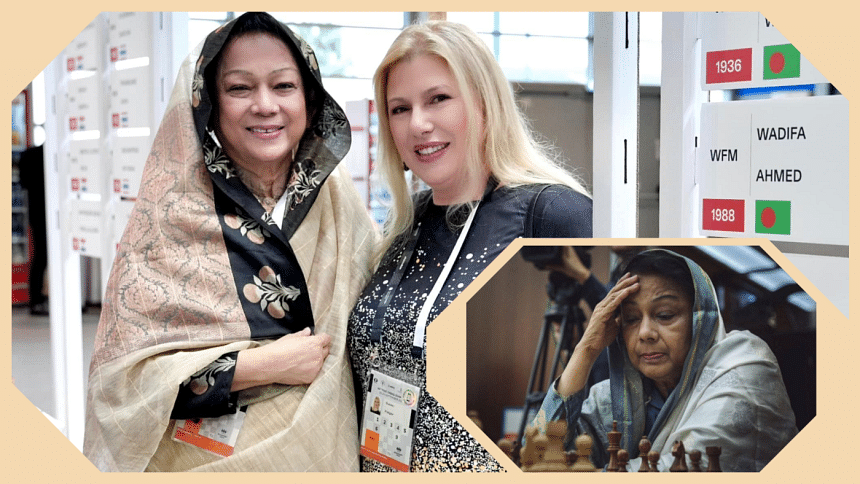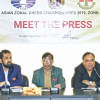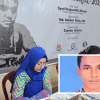‘Love for the game’ still drives Rani Hamid at 81

At 81, Bangladesh's chess icon Rani Hamid remains an enduring source of inspiration. On International Chess Day, marking 101 years since FIDE's founding, she reflects with The Daily Star's Atique Anam on her journey, late start, memorable matches, and more.
The Daily Star (DS): You're one of the oldest active players in world chess. How do people react when you compete internationally?
Rani Hamid (RH): The respect I get is always very gratifying for me. Some chess players say, 'I played against you in that year and so on,' and I reply, 'I can't even remember whom I played yesterday -- how would I remember you?'
But the thing is, since I usually wear sarees, everyone remembers me. And I was the only player who used to wear sarees. There was another lady who used to wear sarees, but not a player, though -- she was the mother of Vishwanathan Anand in his early playing days.
DS: Last year, [former world champion] Susan Polgar shared a photo with you on her social media account, highlighting your career during the Chess Olympiad in Budapest. What did it mean to you?
RH: I consider it as my luck. If it wasn't luck, how would I be in Hungary playing the Chess Olympiad? I wasn't supposed to be there. I was not granted a visa here for not having an old passport with me. But someone from the team couldn't go, so I got a second chance to sort my visa issues. And then I went there and won the first six matches of the event.
DS: Most people your age spend time relaxing with family or enjoying quiet hobbies. What drives you to stay so active and continue playing competitive chess?
RH: The inspiration or strength basically comes from the love for the game. For example, an angler keeps staring at his fishing rod for hours on end. Where do you think this patience and perseverance come from? It's from the love for what he's doing. The same applies for me.
DS: Let's go back to the beginning. You didn't take up chess seriously until later in life. How did your journey with the game first begin?
RH: My chess career is basically a result of the interest and push from my late husband, Lt Col Hamid, who, as you know, was involved in many sporting bodies of the countries in various ways. I was a homemaker with four kids at that time and didn't even go out much. It was due to his insistence that I became a chess player. I was blessed to have had him as my husband, because not many husbands give their spouses that much freedom.
DS: You began playing seriously at around 33 or 34. Was it a gradual process of falling in love with the game?
RH: Not really. Even when I was five or six years old, I used to sit by my father and watch him play very carefully, even though I was a bit restless. I had this strange attraction to the game, although I hardly understood it at that time. And there wasn't an opportunity to play formally at that time. But I was very active in school sports -- including carom, basketball, racing, badminton etc. -- and I excelled in most.
DS: Was there a particular moment or event that sparked your transition from homemaker to competitive chess player?
RH: Well, the father of a school friend of my daughter, Dr Akmal Hossain, was the Pakistan champion at that time. So, I asked my daughter to bring him to our house, and one day, he did come. I used to play a little bit at that time but after playing against him, I realised how good he was. Practising with him helped me improve fast.
DS: You've won the national championship 20 times and the British Open three times. Which of those achievements do you value most?
RH: Every title is important. The national title gives you the privilege of getting guest of honour invitations from different chess tournaments around the world. But winning the British Open was a different feeling because of beating our colonisers at their own home.
DS: Are there any particular matches or moments that you still remember with fondness?
RH: In the past, I had memorable matches against many big players. I can remember once I had kept Anand rooted to his seat for half an hour. He would usually make a move and then roam around -- wouldn't spend more than five minutes on one move. But I kept him thinking for some time. When I went to the washroom, I saw his mum pacing up and down. I told her, "Don't worry, your son is winning. I have just made a wrong move."
DS: Any special performances you look back on with pride?
RH: There was one when I played a Women's Grandmasters tournament in Hyderabad. I beat the women's world No 3. The next day, the Indian chess magazine ran a story on the game, praising me heavily. Then that woman went to the editor of that magazine and verbally attacked him, saying she had let me win the game. Back then, I was in good form -- I also drew against the world No 2 and then I beat the U-18 women's world champion. But that form didn't continue after I suffered a road accident in 1992, and some of my playing partners left the country.
DS: There was a recent incident in India involving your travel companion being sent back, which reportedly left you distressed. Could you tell us what happened and how you dealt with it?
RH: I don't usually go alone to foreign events, especially due to my age. So I went with another player, who had probably played a tournament on a medical visa. We didn't know that and the Delhi immigration said it was a big crime. She didn't kill anyone, didn't steal or smuggle anything -- she was only playing chess. We requested them a lot. There was another event in Mumbai after that, but I didn't go. It was very sad and demoralising for me.
DS: Has that experience changed how you plan for future tournaments abroad?
RH: I don't actually travel abroad alone. Delhi has invited me again but I'm not too keen. What happens is there are so very few tournaments at home, we have to go abroad to play. Otherwise, I would not have bothered.
DS: Chess today is far more digital and data-driven than in the past. Do you ever wonder how your career might have been different with modern tools and training?
RH: What I have got from chess was beyond imagination and I am thankful to Allah for that. But I do feel I could have done better. I was a novice and the federation was too. Playing one tournament a year abroad can't earn you a Grandmaster title. I had got invitations from Australia many times but didn't go because I was alone. I only used to go to London, where my brothers used to live. So, it was playing and family fun both at the same time for me.
Now you can learn a lot by playing online from home and watching the champions play. So of course, things for me would have been different with the tools and techniques -- and a bit of push from the federation and from myself.

 For all latest news, follow The Daily Star's Google News channel.
For all latest news, follow The Daily Star's Google News channel. 








Comments